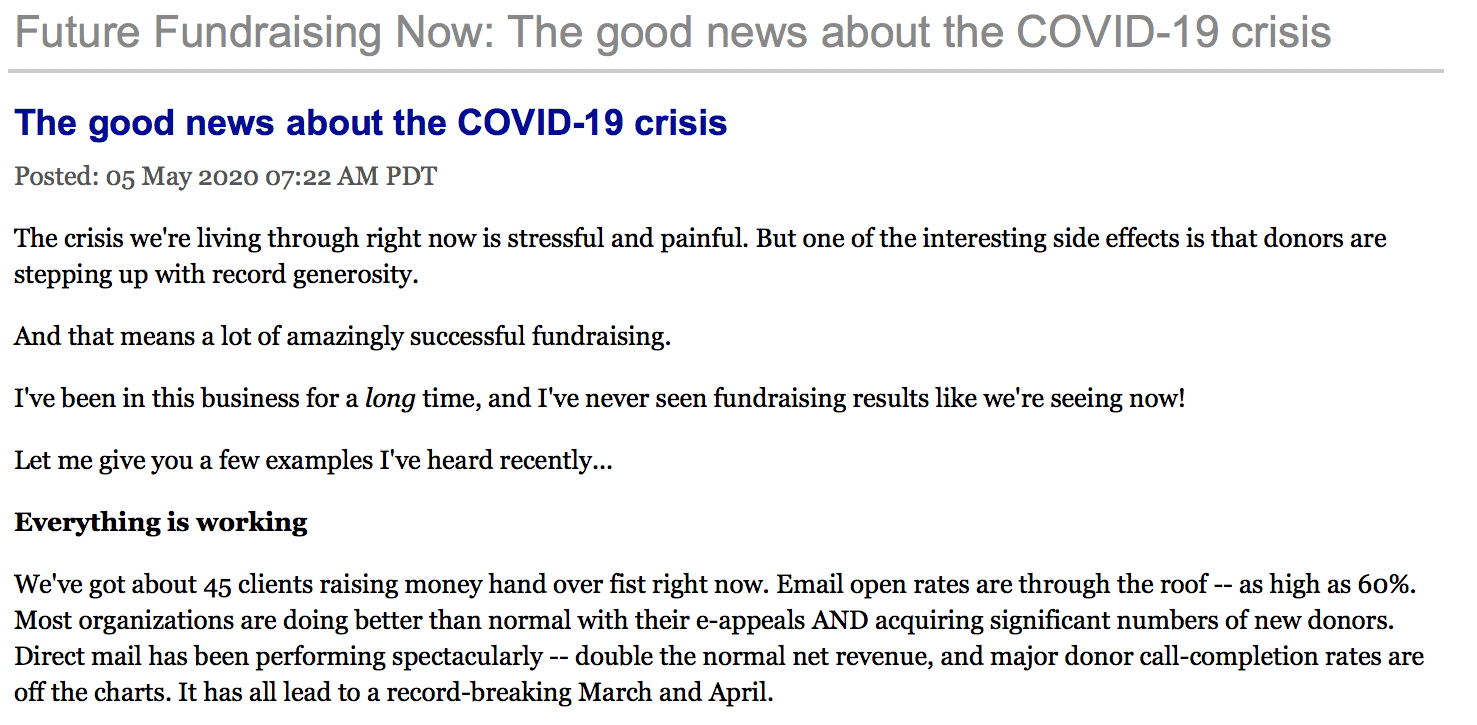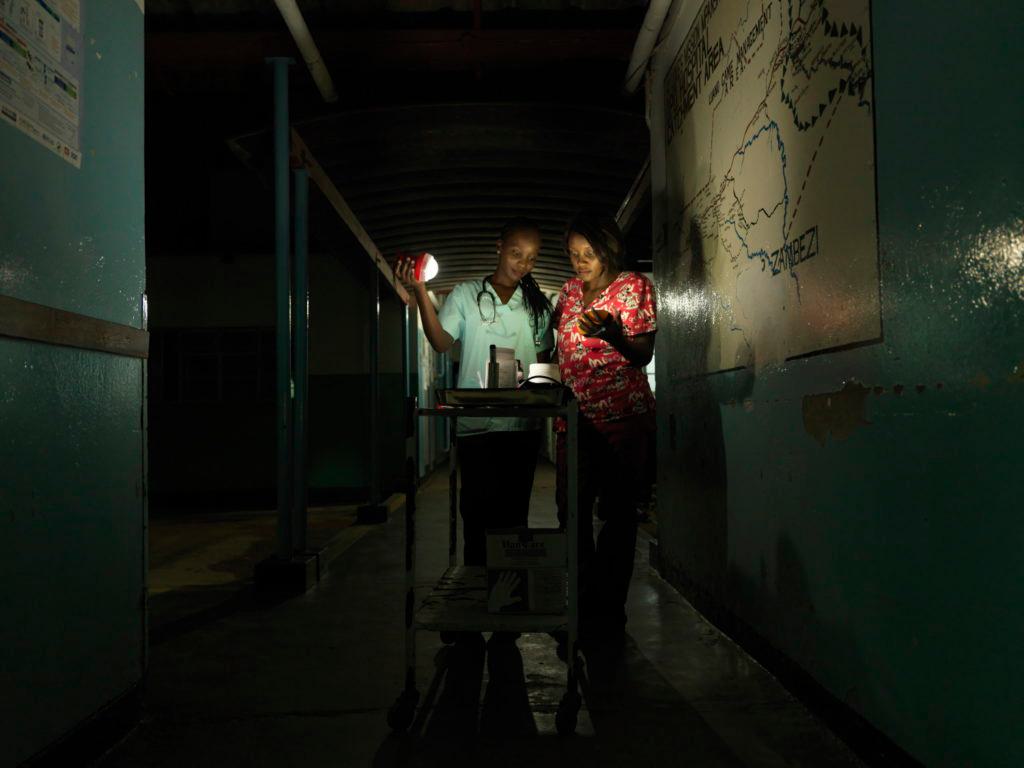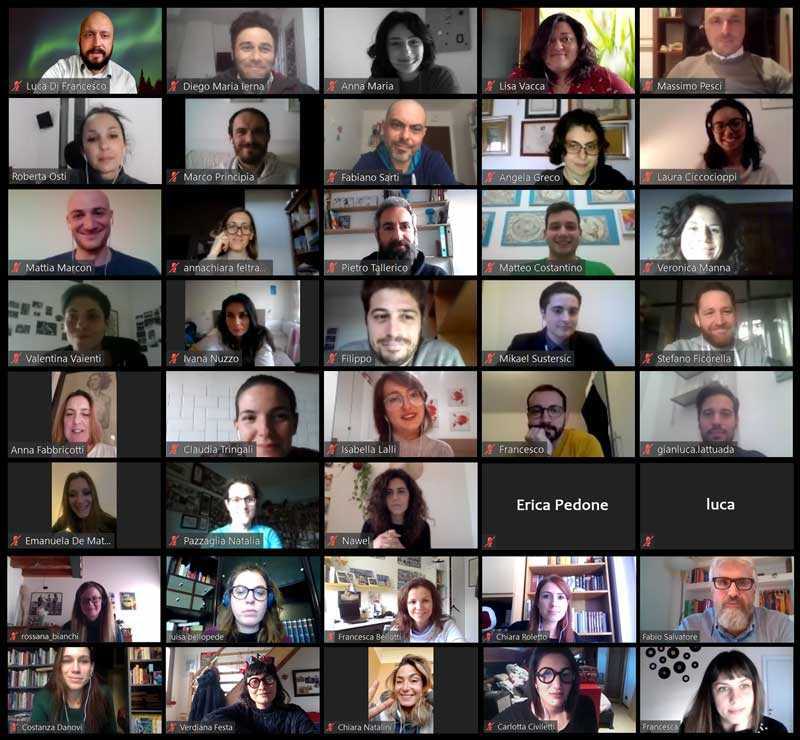Fundraising successes at a time of catastrophe — part two
Part two of our collaborative article looking at amazing fundraising successes in the face of coronavirus from around the world.
- Written by
- Ken Burnett
- Added
- May 07, 2020

Image Source: Vantage Circle
With contributions from Jess Winchester, Dominique Leeming, Mark Phillips, Sean Triner, Richard Turner, Craig Linton and Joe Burnett, plus more to follow. And with huge thanks to all those great fundraisers whose successes are featured here.
This article is a collaborative effort, a work in progress and a call for content from SOFII readers around the world.
In part 1 of this feature we showed how fundraisers around the world are responding quickly and positively to the coronavirus crisis with creative, donor-centred communications that have achieved amazingly good results. More of the same follows below, with the irresistible conclusion that the time has come, at last, to show the doubters and nay-sayers in our organisations that this kind of fundraising works fabulously well and, most importantly, that it’s what donors want from the causes they support. But to prove our point once and for all, we want more examples. So please send your stories of fundraising success at a time of crisis to SOFII’s Joe, here.

Another view from, well, around the world.
Along with his partner, Christiana Stergiou, Australia based Sean Triner set up Moceanic, a world-wide community of fundraisers. With an amazing array of fundraising professionals including Jeff Brooks in the USA and Fiona McPhee in New Zealand, Moceanic provides courses, coaching and mentoring to fundraisers globally, all by online video.
From the start of this crisis Sean’s stance has been to espouse extraordinary donor love and creative, vigorous asking (in a nice and timely way, of course).
‘One of my clients in Italy was hit hard and early. And they responded with record breaking campaigns despite no mail being possible, and few email addresses available. They invested early by calling donors – most of whom are elderly and stuck alone at home. They mixed donor care and asking perfectly, which set a precedent for clients’ learning across the world.’
When SOFII asked Sean to contribute to this piece he said, ‘I’d love to do something. I quickly grabbed a handful of wins from the last couple of weeks and attached them for speed. We have so many to choose from...’
So lovely to hear that! The following eight snapshots come from Sean and his team.
Kit from RAW Artworks, USA.
‘Thanks to the folks who were so quick to support me going into a potentially tough board meeting, with resistance about fundraising, especially as Boston area is now considered in ‘surge’ and the city in which our organisation is located is one of the hot spots. I kept a neutral but convinced tone in my description of the fundraising that we will continue to do at the meeting last Tuesday, cited the white paper of giving surge which is predictably followed by giving slump, and there was no resistance.
We had a fundraising goal of US$365,000 for the first half of the year – two-thirds of which were supposed to come from a gala we could no longer hold. And after a month of asking our donors I am PROUD to share that we have raised over US$265,000 from individuals alone, and are now 75 per cent of the way to our half-year fundraising goal.
We are deepening donor relationships with each new gift. There is LOTS of love going back and forth between our pandemic donor heroes and our organisation these days!’
Marji from the Animal Place.
‘I've been so busy; I have not had a chance to share how our crisis email appeal performed. The bulk of our email list received the appeal March 28th and, in one day, our supporters raised US$30,000! That is a GivingTuesday/December 31st level of giving for our nonprofit. Over that weekend, another US$15,000 was raised. I used all of the tips from the Moceanic webinar on crisis fundraising.
We emailed and called our larger-end donors. The email was a check-in, no ask (several donated in response to it, though). One donor, who received the email and a call from our executive director, donated US$100,000!
To be honest, this pandemic and the collective grief it is producing, along with the added stress of being the sole fundraiser, single parent, working remote...it’s been hard!! So, when people started donating - generously - it was a wonderful reminder of how kind and supportive people are during tough times. It’s made my job easier! ❤️❤️’

Barbara from SOS Community Services, USA.
‘SOS’s emergency appeal has now raised over US$100,000 with two larger gifts (one of US$25,000 and one of US$5,000). We have sent several emails. Our mail house (finally!) got our direct mail appeal in the mail yesterday. So more gifts are expected.
I prepared a media release and sent it out. MLive, the major local news source in Ann Arbor with 44,000 hits to their website daily, picked it up and did a story! We have received a number of gifts online next day as a result. I also recorded a radio interview with WEMU (the NPR affiliate at Eastern Michigan University). So we’re going to be on the radio too. I would have had no idea how to do an emergency appeal without you. Now we will be able to feed and house more people. My heart is full.
So we had some wins today:
· Our half page press ad is out in a regional paper - Joe’s ‘long story’ as an editorial is in three local papers
· We had a short piece ‘message from the CEO’ in MyWeeklyPreview magazine
· Our media release ‘from the chair’ was published in an online regional paper (see web link to our official media release below).
PS the press ad was our first with bank account details included and it triggered 10 donations by bank transfer by lunchtime. Hopefully the first of many to come!’
Greg from a health organisation in Canada.
‘Well it’s been just over a week since we got our first email appeal out the door for COVID-19. We raised about CA$8,000 which was more than we budgeted but well below my own personal expectations. As of Monday at about 4pm I was feeling a little anxious and bummed out, like we had maybe messed up our messaging or something like that. So I left my computer, phone etc and went to have dinner with my family. I came back at about 8pm to shut down my computer and the following had happened:
· One of our major donors had come forward with a gift of CA$100,000.
· A family foundation had put forward an offer of CA$100,000 to be used as matching funds for our campaign.
· Another family foundation confirmed a gift of CA$15,000 to be used as a straight donation or as matching funds.
Holy moly, I basically fell out of my chair! We have not had a lot of stuff out there about our campaign so far, so all these gifts seem to be in response to our initial email and a couple of social posts throughout the week last week. So today we started retooling our campaign to build on the matching money as a major component and refreshing our position to be more clear and donor focused. This has also convinced my Exec team that we should be investing in major gift conversations around COVID-19, not as an aggressive strategy but as a way of being donor-centred and trying to be the charity of choice for donors who are inspired to give at this time.’
Michelle from Ottawa Humane Society, Canada.
‘It took a week and a half and trying to fend off co-editors, but finally sent out a COVID-19 email appeal to the 44,000 names on our email list. I tried to make it look like it came directly from our President & CEO, used a lot of "you" language, and included a lot of fields. Within 20 minutes of the email dropping we raised over CA$4,500… and now, well, we've raised more than CA$90,000 from cash gifts and CA$50,000 from major donors, which is amazing!’
Mary Callan – Shrine of Our Lady of Guadalupe, USA.
‘We have a major donor that likes to offer a matching challenge each year, with the revenue normally going to our capital campaign. This year, though, we asked if he would let the revenue go toward general operating funds, as we are going to take quite a hit financially with the pandemic (we depend on foot traffic - pilgrims- for a large amount of donations).
He said yes! Our donors loved it. He offered US$25,000 as a dollar-for-dollar match, and we opened it up to a broader audience than normal, through email and social media. He offered to let us use his picture and his name, which really helped a great deal (people loved seeing that there was a real person behind that match!). Within 10 days, we raised over US$71,000, which for us in a strictly digital appeal is great.
AND we have had two bequests committed over the last two weeks from our amazing donors. It shows that especially in difficult times, while most are at home and contemplating the future, good people are keeping good nonprofits in their hopes and dreams (for this life and for generations!).’
Judy Elliot – International China Concern, UK.
‘We sent an emergency appeal to everyone on our list and within the first 30 minutes it generated £2,300! People who have never given before made their first gift.
Our latest figures are 16 per cent response to the e-mail appeal and eight per cent to the direct email. To date we’ve raised over £43,000. To put those figures into context it is 400 per cent more than we have ever raised from an appeal. Previously our biggest ever single campaign raised almost £14,000.’
And in the UK…
Another SOFII trustee, Richard Turner, gives a snapshot of several more successful appeals from around Britain.
Royal National Lifeboat Institution (RNLI).
The RNLI, better known as ‘The Lifeboats’ doesn’t exactly spring to mind when you think of COVID-19 response charities. However, since the crisis began their supporter communications have been fabulous, even being chosen for SOFII’s IWITOT this year.
They have led with a message ‘We are one crew’, along with emphasising to donors that at a time when they feel powerless they are actually powerful. Donors have enabled RNLI to continue its work because of the past support they have given. One donor wrote back to say: ‘I can’t tell you how much it meant to hear your words, to feel your support’ adding ‘I’ve not managed to write yet as every time I try a fresh wave of emotion overwhelms me once again!’.
RNLI’s spring email appeal, to help refit and update an aging boat, is already an impressive 17 per cent ahead of target with four weeks still to go. Jayne George, who leads their fundraising, added, ‘People giving to something they know, and trust is a powerful outlet right now’. This is messaging the RNLI had already been working on – showing that preparation and investment really do pay off – but also in a time of crisis, people want to give to causes they love.
International development is less close to home and, arguably, lower down people’s priorities at this time. SolarAid have had to stop their usual activity of selling solar lights in remote rural areas of Malawi and Zambia. They have focused their energy on alerting local communities and equipping rural health centres with solar light.

The online and email ‘Moment of Sunshine’ appeal has already approaching £100,000, https://solar-aid.org/moment-of-sunshine-appeal/ with individuals generously leading the way, and other funders now matching supporters contributions. Donors are also asked to share their moment of sunshine when they give such as this ‘...Enjoying seeing, hearing, smelling and getting my hands dirty in nature all around me. Enjoying watching families walking together past my windows’. Check out this video by a supporter https://solar-aid.org/moment-of-sunshine-milestone/.
Whilst SolarAid has had to change what they do they remain very much on mission, getting light to those left in the dark. Moreover, SolarAid staff feel energised at the work they are doing and so do their supporters.

The Royal Air Force Association (RAFA).
RAFA have also had to change what they do. https://www.rafa.org.uk.
Thinking fast and working hard they have developed four projects including bad drops and a support line for the ‘RAF community’ – serving and retired personal, veterans, and their families. One of these projects, run by the adaptable fundraising team is ‘Project Entertain’. Each week they send out content to keep people occupied from quizzes, to live interviews with a Red Arrows pilot, history seminars, 40’s singalongs and a popular fitness class run by an RAF fitness instructor for all ages. You can sign up here. https://www.rafa.org.uk/operation-connect/operation-connect-entertainment/

RAF Air bases have been only too willing to help, along with key personalities connected to the air force offering to get involved. Their individual appeal – the first in many years as they start a new fundraising strategy – is doing well with a high average gift of £43.00. Subscribers to their email are increasing. But the real value is the strengthening of supporter relationships from asking the question what do we need to do to support our community? As a result, supporters of RAFA ‘feel closer’. Director of marketing and fundraising Rachel Huxford said there is plenty they will continue to do after the crisis from all they are learning.
Freedom from Torture.
Should you send out an appeal at this time? This was the question Freedom from Torture asked when reviewing their annual appeal. The answer – at a time those they support, asylum seekers will feel even more isolated – this wasn’t the time to step back. Quite the opposite.
Their director of fundraising, Sam Ahfim, put the case at an emergency board meeting with trustees, ‘If we’re not willing to put our beneficiaries first and communicate their need to the public at the time of crisis, then who are we as a charity? We will get less criticisms but we will have done the least-worst thing. Charities were not started to do the least-worst thing!’.
Thinking on their feet they added a lift letter from the CEO and created an appeal called ‘Do what you can’. Donors can fill a shopping bag ranging from hand sanitiser, phone credits, sanitary products to a weekly grocery shop. New donors have come on board with four-figure donations and their appeal has passed £400,000.
Asthma UK.
Asthma UK have a communication strategy in place to provide clear advice to those with asthma, often led by their in-house doctor. This is something they have been doing for over a year. Now they’ve had to step it up.
In providing this advice they’ve not shied away from making it clear they need donations – with a clear opportunity to give alongside the advice. They have adopted a Wikipedia style ask – if you’ve find this information helpful please consider giving a donation – highlighting the demand on their services with an eight-fold increase in calls to their helpline. All this made possible due to investing in an online platform that makes this approach easier to implement.
Donations, in their words, ‘have gone through the roof’.
So, what are the lessons that are emerging?
· If you think fundraising won’t work, it won’t be because you cut budgets, depress staff, furlough fundraisers. And it will be a self-fulfilling prophecy.
· If you have invested in fundraising, understand your supporters, already earned respect with your supporter communications, then you’ll probably fair better than those that have put that investment off.
· As RAFA have found your fundraising team are amongst the most adaptable staff you have – if they can’t do what they usually do – then get them focused elsewhere.
· People want to give, especially in a time of crisis. The question is will their favourite causes give them the opportunity, as Freedom from Torture and SolarAid have done? If not, they will seek their urge to do something helpful, whilst stuck at home, elsewhere.
· If you feel able to launch an emergency appeal then great as part of your response then do so – but still use this opportunity to reach out to your supporters and strengthen your relationship with them as RNLI and RAFA have shown.
New initiatives are popping up everywhere.
At times of crisis, they really do. Captain Tom’s initiative is just one example designed to aid today’s most obvious beneficiaries, the doctors, nurses, carers and ancillary workers we depend upon at such times. Another has appeared in Italy where a working group consisting of a partnership between career consultants Job4good and Italian professionals from the fundraising sector, under the patronage of Assif (Associazione Italiana Fundraiser – the Association of Italian Fundraisers) has created a special task-force to support the Italian health sector with effective fundraising counsel throughout the coronavirus crisis. The beauty of this is that these fundraising professionals are offering their services pro bono to any public health facility that needs them.
Hopefully fundraising consultants and other professionals everywhere can take a lesson from this.

Job4good is a social project created in 2016 as a third-sector job-posting platform. It aims to match professional supply and demand in the Italian non-profit sector. This initiative was possible thanks to the pro-bono contribution of professionals in the third sector and in fundraising who came together to take action during this crisis.
We make no apology for the length of this article, because its central point is one that really needs to get across. At times of crisis it pays show concern for our supporters and to ask them properly, respectfully and promptly for whatever is appropriate for them to give. Because that’s what donors want.
We hope this short, very partial review of fundraising success at a time of crisis will lift spirits everywhere and give fundraisers around the world confidence and courage to continue to talk positively to donors and to give all supporters the opportunity to be engaged and involved in what they really love doing – making a difference for others at a time of great need, through the causes and initiatives that they believe in.
Please continue to send SOFII your fundraising success stories. Email joe@sofii.org here.




















